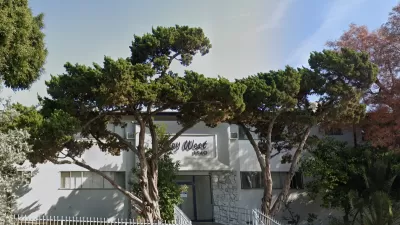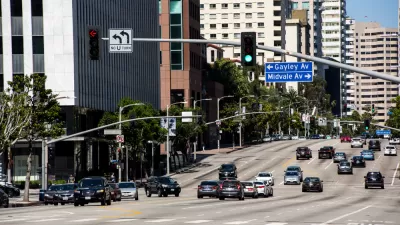Desperate to build hotel capacity in the neighborhood surrounding the Los Angeles Convention Center, the city has granted hundreds of millions in tax breaks to hotel developers. Some are asking the city to rethink the subsidies.
David Zahniser reports on Los Angeles’ ongoing practice of granting tax breaks to developers of hotels. The city, which first started granting tax breaks for hotel developers in 2005, has granted as much as $508 million in tax benefits over the coming decades.
In question is Greenland US Holding Inc, the developers of Metropolis, a proposed 350-room hotel development adjacent to L.A. Live and the Los Angeles Convention Center. The developers are asking for $92 million in tax subsidies to make the deal pencil out.
“Convention Center Executive Director Robert ‘Bud’ Ovrom, although a longtime champion of city subsidies, questioned whether L.A. should provide the taxpayer support in this case. Greenland is planning only 350 hotel rooms, even though the city has granted permission to develop nearly five times that amount, he said,” writes Zahniser.
“Financial help might make sense, Ovrom said, if Metropolis offered 900 rooms, a number that would help the city attract more national conventions and mean more local jobs.”
The hotel tax issues, especially with reference to the Metropolis development, speaks to Los Angeles' current, difficult situation in the downtown neighborhood of South Park. The city is desperate for hotel room capacity and density near the convention center and L.A. Live, but is also concerned that the once-in-a-generation opportunity to build on the neighborhood of South Park’s current surface parking lots should be built to the maximum allowance of the zoning code.
FULL STORY: L.A. should be more selective with hotel tax breaks, some say

Maui's Vacation Rental Debate Turns Ugly
Verbal attacks, misinformation campaigns and fistfights plague a high-stakes debate to convert thousands of vacation rentals into long-term housing.

Planetizen Federal Action Tracker
A weekly monitor of how Trump’s orders and actions are impacting planners and planning in America.

San Francisco Suspends Traffic Calming Amidst Record Deaths
Citing “a challenging fiscal landscape,” the city will cease the program on the heels of 42 traffic deaths, including 24 pedestrians.

Defunct Pittsburgh Power Plant to Become Residential Tower
A decommissioned steam heat plant will be redeveloped into almost 100 affordable housing units.

Trump Prompts Restructuring of Transportation Research Board in “Unprecedented Overreach”
The TRB has eliminated more than half of its committees including those focused on climate, equity, and cities.

Amtrak Rolls Out New Orleans to Alabama “Mardi Gras” Train
The new service will operate morning and evening departures between Mobile and New Orleans.
Urban Design for Planners 1: Software Tools
This six-course series explores essential urban design concepts using open source software and equips planners with the tools they need to participate fully in the urban design process.
Planning for Universal Design
Learn the tools for implementing Universal Design in planning regulations.
Heyer Gruel & Associates PA
JM Goldson LLC
Custer County Colorado
City of Camden Redevelopment Agency
City of Astoria
Transportation Research & Education Center (TREC) at Portland State University
Jefferson Parish Government
Camden Redevelopment Agency
City of Claremont




























